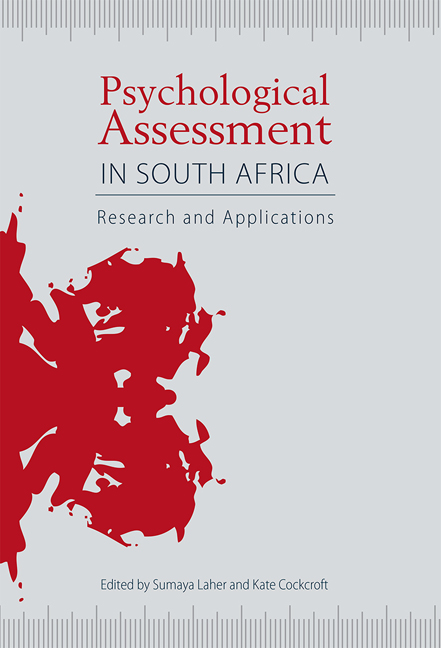Book contents
- Frontmatter
- Contents
- Tables and figures
- Acknowledgements
- Acronyms and abbreviations
- 1 Contextualising psychological assessment in South Africa
- Section One Cognitive tests: conceptual and practical applications
- Section Two Personality and projective tests: conceptual and practical applications
- Section Three Assessment approaches and methodologies
- 28 Ethical perspectives in assessment
- 29 Using computerised and internet-based testing in South Africa
- 30 The ImPACT neurocognitive screening test: a survey of South African research including current and projected applications
- 31 A family consultation model of child assessment
- 32 Qualitative career assessment in South Africa
- 33 Psychological assessment and workplace transformation in South Africa: a review of the research literature
- 34 Assessment of prior learning: a South African perspective
- 35 Large-scale assessment studies in South Africa: trends in reporting results to schools
- 36 Current and future trends in psychological assessment in South Africa: challenges and opportunities
- Contributors
- Index
35 - Large-scale assessment studies in South Africa: trends in reporting results to schools
from Section Three - Assessment approaches and methodologies
Published online by Cambridge University Press: 21 April 2018
- Frontmatter
- Contents
- Tables and figures
- Acknowledgements
- Acronyms and abbreviations
- 1 Contextualising psychological assessment in South Africa
- Section One Cognitive tests: conceptual and practical applications
- Section Two Personality and projective tests: conceptual and practical applications
- Section Three Assessment approaches and methodologies
- 28 Ethical perspectives in assessment
- 29 Using computerised and internet-based testing in South Africa
- 30 The ImPACT neurocognitive screening test: a survey of South African research including current and projected applications
- 31 A family consultation model of child assessment
- 32 Qualitative career assessment in South Africa
- 33 Psychological assessment and workplace transformation in South Africa: a review of the research literature
- 34 Assessment of prior learning: a South African perspective
- 35 Large-scale assessment studies in South Africa: trends in reporting results to schools
- 36 Current and future trends in psychological assessment in South Africa: challenges and opportunities
- Contributors
- Index
Summary
The significant increase in the use of large-scale assessment studies (LSAS) for education reform (Benveniste, 2002; Kellaghan & Greaney, 2001; UNESCO, 2000) can be attributed to a number of causes, including the focus on learning outcomes as an indicator for education quality, the emphasis on the results agenda as advocated by the international donor community (Lockheed, 2011), and the impact of globalisation on education in general and assessment in particular (Carnoy, 2000; Jansen, 2001). The focus on measuring learning outcomes as an indicator of education quality was advocated at the 1990 Education For All (EFA) world conference in Jomtien (UNESCO, 2000), and reinforced at the 2000 EFA world conference in Dakar (Kellaghan & Greaney, 2003). The emphasis on cognitive outcomes is best understood when viewed in the context of the following argument presented in the EFA Global Monitoring Report (UNESCO, 2004, p.43):
… there is good evidence to suggest that the quality of education – as measured by test scores – has an influence upon the speed with which societies can become richer and the extent to which individuals can improve their own productivity and incomes. We also know that years of education and acquisition of cognitive skills – particularly the core skills of literacy and numeracy – have economic and social pay-offs … Education systems that are more effective in establishing cognitive skills to an advanced level and distributing them broadly through the population will bring stronger social and economic benefits than less effective systems.
While LSAS have the potential to significantly impact on what is taught and how it is taught (Abu-Alhija, 2007; Black & Wiliam, 2007), there has been limited focus on the impact of these studies on the learning and teaching process (Kellaghan & Greaney, 2003; Pellegrino, Chudowsky & Glaser, 2001; UNESCO, 2000). It is also widely recognised that the number of countries conducting LSAS is likely to increase in the future (Forster, 2002). Given the significant financial and human resource investments required for conducting LSAS, there is an urgent need to ensure that these studies yield greater value for money – that is, an increase in learning outcomes. However, there is limited information pertaining to the cost benefit of these studies (Kellaghan & Greaney, 2001).
- Type
- Chapter
- Information
- Psychological Assessment in South AfricaResearch and Applications, pp. 516 - 534Publisher: Wits University PressPrint publication year: 2013



